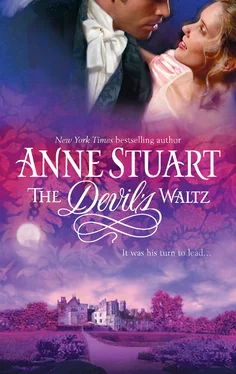The poor girl wasn’t happy with her dismissal, but Annelise was not about to give anyone the satisfaction of seeing her reaction. She waited until the maid had vanished down the hallway toward the servants’ stairs and then went into her room. She managed to close the door behind her before she stopped still.
Beautiful spring flowers. Irises, daffodils, delicate tea roses, all in the softest pastel shades. Small, perfect, exquisite.
The card lay on the table beside them, and her name was written quite clearly in dark ink, an impatient, masculine hand. The Hon. Annelise Kempton. And she felt a sudden, wrenching disappointment. They couldn’t be from him. Christian Montcalm didn’t know her name.
And for heaven’s sake, why would he be sending her flowers? She was a thorn in his side, far worse than the ones still adorning Hetty’s pink roses, and he was hardly likely to be rewarding her. It had to be Chipple, except that she lived in his house, had seen his garish taste, and he couldn’t have ordered such a perfect, delicate bouquet.
And then she saw the snapdragons amidst the flowers. She opened up the sealed envelope, gingerly, as if she expected spiders to pop out. The actual note was even worse—“Dragon—let me know when you’re ready for lesson three.”
She could feel color suffuse her body, and she was a woman who had trained herself not to blush. It was the same handwriting—he knew her name after all, even if he preferred to call her that awful term. Dragons were large, fire-breathing, scaly creatures, and besides, they were the ones who endangered the maidens, weren’t they? He was getting his mythology all wrong.
If she had sense at all she’d open the windows and dump the flowers out into the garden below, so that one of Chipple’s army of servants would take care of them. But there were times when beauty overruled her senses, and flowers were one of her weaknesses. She loved the scent of spring flowers, the hint of hope and new life, and especially the soft yellows and lavenders and pinks of their petals.
She was strong enough to ignore where these came from, wasn’t she? She’d simply destroy the note so no one could see it.
Burning would be the only choice—servants tended to be curious about things, and who could blame them? But the coals had died down completely, leaving the fireplace cold.
Her shapeless brown-striped dress had no pockets, and she couldn’t leave the note lying about. She folded it carefully and tucked it between her breasts, the only secure place she could think of. Shoving her hair into a hasty knot at the back of her head, she slipped into her shoes and left the room, closing the door behind her.
Christian Montcalm kept rooms on Upper Kilgrove Street. As a single gentleman he wasn’t expected to have a town house, which was a damned good thing, because he was already six months in arrears on his rent, and only his charming smile kept him from being tossed out on the street. That and the fact that he had a plump, elderly landlady rather than a landlord, who fed him tea and cookies and treated him as an indulgent mother would treat her son.
There were times when he almost couldn’t remember his beautiful mother, a part of a different world, it seemed. All that was long in the past, a time he’d just as soon forget, since there was no returning.
He’d been born in France, which to some people might make him French. Those people would be wrong.
The Montcalms were an old, proud family. His grandfather, the Viscount Montcalm, had been the brother of a duke, and he’d been a cold, heartless old man, more concerned about the family name than the actual members of it. Christian’s own father, Godfrey, had been the younger son, with no title, and he’d made the grave error of falling in love with a Frenchwoman. Madeleine de Chambord was a great beauty, daughter of a marquis, with enough wealth that though Christian’s grandfather railed against the match he couldn’t actually stop it. When Geoffrey had chosen to make his home in France there was nothing the viscount could do about it—there was too little money left in the estate to use blackmail, and Madeleine was far wealthier than the Montcalms. The viscount had written off his younger son, and Geoffrey and Madeleine had made a very happy life in a small château in Normandy.
He was the second of five children—three boys and two girls. His older brother, Laurent, had always been a bit of a prig—he’d taken his role as eldest brother seriously, and tended to preach down to his four siblings. After Christian came Helene, and it was clear from the age of two on that she was going to rival her mother’s great beauty. Then Jacqueline, plump and freckled and so mischievous that their father would toss her in the air and call her the spawn of the devil, to which she’d reply, “Then you must be the devil,” much to the amusement of Geoffrey and Madeleine and the disapproval of Laurent.
And then there was baby Charles-Louis with golden curls, wide blue eyes and the sweetest disposition. While Laurent might have felt responsible for the rest of the children, with Christian it was his baby brother with whom he had the strongest connection. He’d had great plans—he would teach him to ride, fight, how to flirt with girls and not listen to little prigs like Laurent.
A happy family they’d been, the seven of them, with Madeleine’s elderly grandmother joining them, and various cousins coming and going in a vast, casual open house.
He should never have left. No one talked about what was going on, as if such news was distasteful, but he should have known somehow. Laurent had been sent to England to meet his disapproving grandfather when he reached the age of fourteen, and had actually met with the old man’s approval before returning to the family home. It was little wonder—they were both disapproving, self-righteous toads, young Christian had thought mutinously.
And then it had become his turn. He hadn’t wanted to leave—he knew he would hardly meet with the same kind of fellow-feeling. Laurent (or Laurence, as the viscount referred to him) was the good son, obedient, respectful. Christian was the bad one, always getting into trouble, much to his father’s amusement and his mother’s despair. She would cry over him, sometimes. He could remember that. She cried when he got into a fight with three farm boys and they’d beat him to a bloody pulp. They hadn’t looked so good afterward, but he’d refused to give their names. A peasant who laid a hand on the aristocracy was risking his life, even if he was only a child. And Christian had been ten years old and looking for a good dustup.
He did everything he could to keep from getting on the boat to England, including sneaking off one and walking all the way back to St. Matthieu while his mother wept with anxiety. It was the only time he remembered seeing his father angry with him, and the next time when they took him to the boat he stayed on it, mutinously. Not that they’d had any choice—they’d sent him with one of the burly footmen who deposited him at his grandfather’s estate in England, turned around and headed straight back to France before Christian could manage to follow him.
He hated his cold, miserable grandfather almost as much as the old man hated him. Christian was too much like his mother, the old man told him. Pretty and useless and too French. And Christian had shouted back that he was much happier being a Frenchman than a stuffy, pale, stupid Englishman with too much pride and no heart.
The viscount had backhanded him across the face. The altercation had unfortunately taken place at the top of the stairs, and Christian had fallen, breaking both his arm and leg, keeping him from returning to France when it had been originally planned.
He always blamed his grandfather. Not for the slap, not for the broken bones. But for keeping him away from France, just long enough that he couldn’t go back. The Terror was sweeping over the nation, and it even reached the peaceful beauty of the Normandy countryside.
Читать дальше












